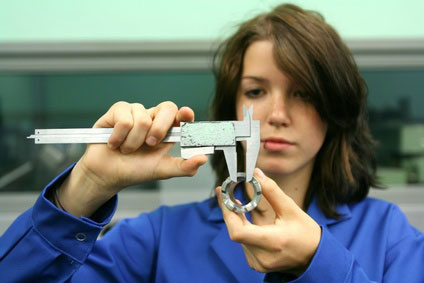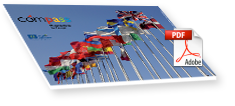The COMPASS-Project
 Gaining international experience is evermore important not only to enhance job opportunities on the labour market but also for the professional advancement. Stays abroad for work and internship measures are in turn increasingly popular and are also sponsored by respective European programmes. They provide a good basis to broaden professional qualifications, improve skills in foreign languages and to develop personal abilities in an intercultural environment.
Gaining international experience is evermore important not only to enhance job opportunities on the labour market but also for the professional advancement. Stays abroad for work and internship measures are in turn increasingly popular and are also sponsored by respective European programmes. They provide a good basis to broaden professional qualifications, improve skills in foreign languages and to develop personal abilities in an intercultural environment.
However, one problem was how to document the learning accomplishments generated abroad: Upon their return, the participants account of mainly positive results in view of personality development and the ability to mix in environments of different cultures. Beside this, the professional gain in practical experience is often not explicitly stated. In turn it is not always clear, where is the professional advantage of an internship abroad? That’s where the COMPASS project comes in.
Project background
Given the aim to enable 80,000 people in Europe to participate in vocational mobility programs per year until 2013, the Leonardo-da-Vinci-Mobility program's promotion is continuously growing on an annual basis. With the beginning of the new program generation 2007-2013, the application of so-called “pool projects” was made possible. A higher figure of job placements available should thus particularly encourage the mobility of individual participants (free mover) within the EU.
For the participating organisations this means heavier challenges in organising mobility programs: They have to adjust their job placement schemes to a wider range of participants with individual requirements, experiences, educational needs and commercial interests. Quality criteria set up for “pool projects” prescribe, in line with nation-wide accessibility also publication of representative statements with regards to contents and aims of the relelvant stay abroad thus rendering selection criteria more transparent. Personal selection and counselling interviews should be conducted with the participants in order to guarantee fitting individual placements in the relevant internship companies. This however results in several difficulties due to the structure of mobility programs:
 In case of a vacant position, the contact between the posting institution and the applicant is generally limited to a short period. Normally the assessment of educational and qualification needs can only be based on experiences and observations from previous learning processes to a limited degree. As a consequence and due to such compressed preparation time, there is a tendency to only consider particpants who are, due to already existing qualifactions, deemed to certainly meet the requirements of the admitting institution. In contrast, participants are disadvantaged if they do not submit adequate records or if they are unable to formulate goals in connection with their job placement abroad.
In case of a vacant position, the contact between the posting institution and the applicant is generally limited to a short period. Normally the assessment of educational and qualification needs can only be based on experiences and observations from previous learning processes to a limited degree. As a consequence and due to such compressed preparation time, there is a tendency to only consider particpants who are, due to already existing qualifactions, deemed to certainly meet the requirements of the admitting institution. In contrast, participants are disadvantaged if they do not submit adequate records or if they are unable to formulate goals in connection with their job placement abroad.
This reduces participation opportunities for participants:
-
without concluded vocational training or with little practical knowledge,
-
who are unemployed or currently in a phase of professional re-orientation,
-
who are not integrated into vocational or further training. Thus educational and qualification needs cannot be substantiated in advance and learning achievements cannot be directly stabilised and credited after the stay abroad.
 Although practical professional tasks are a major characteristic of job placements abroad, interviews with former participants confirm that they considered their stay abroad as being particularly benefitting for the development of personal and social capacities. This is a positive result, however it does not always meet the expecations of the posting companies and prospective employers, since, considering experience, the job qualifying value of a job placement abroad increases with the latter's duration: only then do participants have the opportunity to get familiar with complex subject areas and tasks as a "team member", thus they make extensive use of their knowledge and skills on a practical professional level. On the other hand, this impedes groups of people who do not meet the requirements for longer stays abroad, due to their unfavourable socio-economical background.
Although practical professional tasks are a major characteristic of job placements abroad, interviews with former participants confirm that they considered their stay abroad as being particularly benefitting for the development of personal and social capacities. This is a positive result, however it does not always meet the expecations of the posting companies and prospective employers, since, considering experience, the job qualifying value of a job placement abroad increases with the latter's duration: only then do participants have the opportunity to get familiar with complex subject areas and tasks as a "team member", thus they make extensive use of their knowledge and skills on a practical professional level. On the other hand, this impedes groups of people who do not meet the requirements for longer stays abroad, due to their unfavourable socio-economical background.
Here the survey on the impacts of Leonardo da Vinci mobility programs presses for special actions. It was important to:
a) enhance preparations and mentoring of mobility programs, particularly to win over target groups with an unfavourable socio-economic background for job placements abroad,
b) adjust the choice of admitting companies and to enhance listing of learning achievements, since generally, the value of mere job placement and participation certificates cannot be [fully] assessed by prospective employers.
It is true that the Europass Mobility envisages listing achieved comptences, however the latter’s description remains with the supporting organisations. Thus, in the European context, transparency and usability are limited, if the completion of a job placement abroad does not directly result in transfer to the salary payroll or if consolidation and acceptance of learning achievements cannot be obtained in follow-up professional development. The positive vocational impacts of staying abroad can thus be used only on a limited scale.
 In the process, there is an increase in significance of key capacities for raising the educational level and procurement of high-quality jobs. The recommendations for key capacities and life-long learning made by the European Parliament and the Council postulate a goal for European educational policy to enable everyone to develop and update suitable key capacities, required for every day life, learning and career. There is increasing expectation for people to dispose of not only adaptability but also flexibility, entrepreneurial spirit, capacity for innovation, creativity, own responsibility and personal motivation. In order to get along in an ever-growing networked world, people should be able to retrieve and make reasonable use of available information by means of interactive media and communications. They should be in a position to interact with people from different cultures and within heterogenous social groups. In order to adapt to changes, the capacity of reflexive thinking and actions is also required. This should not exclusively serve routine application but also enable applied adaptation of tools, methods and pro-active approaches. Job placements abroad provide excellent opportunities for training and verifying related skills.
In the process, there is an increase in significance of key capacities for raising the educational level and procurement of high-quality jobs. The recommendations for key capacities and life-long learning made by the European Parliament and the Council postulate a goal for European educational policy to enable everyone to develop and update suitable key capacities, required for every day life, learning and career. There is increasing expectation for people to dispose of not only adaptability but also flexibility, entrepreneurial spirit, capacity for innovation, creativity, own responsibility and personal motivation. In order to get along in an ever-growing networked world, people should be able to retrieve and make reasonable use of available information by means of interactive media and communications. They should be in a position to interact with people from different cultures and within heterogenous social groups. In order to adapt to changes, the capacity of reflexive thinking and actions is also required. This should not exclusively serve routine application but also enable applied adaptation of tools, methods and pro-active approaches. Job placements abroad provide excellent opportunities for training and verifying related skills.
Thus there is need for mobility projects to better display the connection between personal capacity gains and corresponding vocational impacts in order to improve accreditation and usage of obtained learning achievements. The listing of job relevant tasks carried out during the internship should be complemented by indications of cultural capacity, i.e. the ability to apply individual knowledge and skills in a flexible and situational way, adapted to intercultural contexts and with work-related purpose.
Implementation
 This is where the starting point of the project will be. A trans-nationally adjusted framework is devleoped by means of the definition and documentation aids. Between the partners, this framework facilitates adjusting learning goals and requirement profiles for European mobility projects. Moreover, this framework helps to describe learning achievements with regards to job specific, as well as inter-cultural capacity gains. Since these are presented in six European languages, topics of job placements agreed upon together with the participants can be submitted to the admitting institutions and companies much easier. Likewise, acquired learning achievements can be re-translated more easily and can in turn be certified in the Europass Mobility by the relevant sending institution.
This is where the starting point of the project will be. A trans-nationally adjusted framework is devleoped by means of the definition and documentation aids. Between the partners, this framework facilitates adjusting learning goals and requirement profiles for European mobility projects. Moreover, this framework helps to describe learning achievements with regards to job specific, as well as inter-cultural capacity gains. Since these are presented in six European languages, topics of job placements agreed upon together with the participants can be submitted to the admitting institutions and companies much easier. Likewise, acquired learning achievements can be re-translated more easily and can in turn be certified in the Europass Mobility by the relevant sending institution.
In order to facilitate the application of the definition and documentation aid, we envisage the creation of an online database. By means of an „e-portfolio“, occupational capacity and job profiles can be pooled together with greater flexibility. In contrast to previous processes, the advantage lies in the fact that the adjustment process between all trans-national mobility program participants can be designed interactively. Thus adjustment, adding of content and learning goals can be carried out continuously and according to feedback.
For the listing of learning achievements, the definition and documentation aid creates the foundations to which the occupational and inter-cultural capacities obtained in the job placements can be allocated. They can be harmonised between the participating companies, organisations and participants, in order to encourage the mutual acceptance of learning achievements in a trans-national context.
STEPS
Task package No. 1: Layout of project structures
Goal: Layout of communication and working patterns of the project; Coordination of tasks and responsibilities for implementation with the project partners. Establishment of a project website and publication of project flyers.
Tasks: ARBEIT UND LEBEN takes over the build-up of communication structures, as well as the coordination of duties and processes within the project, creation of the project-website and also coordinates the external presentation of the project and relevant flyers. 3s introduces the project partners to the development mechanism of tasks and capacity profiles via the VQTS-Model against the background of the first coordinating meeting. OTS presents the existing working experiences with portfolio approaches in terms of students’ capacity profiles and their integration into the planning of job qualifying processes. For completion of this phase EISS will conduct a survey among the project partners in how far project and communication structures can be considered suitable for the realisation of tasks. In case of critical feedback, adjustments will be made in agreement among the project partners.
Results: The partnership disposes of the necessary communication channels, responsibility concerning the scope of tasks is agreed upon by the partners, main topics regarding content for the development phase have been agreed, tandem-partnerships have been established. The project website is functionning and the project flyer has been published in the project partners’ relevant languages.
Task package No. 2: development of the definition and documentation framework
Goal: The definition and documentation framework for occupational certification of inter-cultural capacities has been developed and adjusted for selected occupational areas.
Tasks: In cooperation with the Polish partner organisation ZG ZDZZ, a three-day workshop will be organised in Warsaw, in the course of which all partners, under the guidance of 3s research laboratory, collaborate in small groups in order to develop „can-do” descriptions, based on present characteristics for intercultural compentences and descriptions of occupational task areas.
Afterwards, 3s will process these descriptions into an overview according to the allocation of capacity areas and occupational task areas. This overview will be worked on in agreement among the project partners and by external experts. Ultimately, a final version of the definition and documentation framework will be published. AL will put the results online.
In line with this process, OTS developes the e-portfolio’s structure and begins with the latter’s coding.
For termination of this project phase, EISS will present the finished definition and documentation framework to representatives of selected companies from Great Britain, in order to clarify in how far the system is considered comprehensible and helpful for the assessment of occupational intercultural capacities.
Results: The definition and documentation framework is present and contentswise processed for different work fields. An exhaustive and applicaple definition and documentation framework has been established, which can be used for extending the approach to further work fields.
Task [package] No. 3: coding of the e-portfolio
Goal: An internet database is being coded, enabling the inter-active application of the developed definition and documentation framework for planning and execution of trans-national mobility programs. Organisers of posting and admitting institutions will find it much easier to create and adjust requirement profiles for mobility projects. Applicants can create their own capacity profile and compare the latter with requirement profiles of registered mobility projects.
Tasks: The Odense Tekniske Skole develops a database structure, which by means of input masks and search engine functions allows to access and select job profiles, corresponding task areas, as well as capacity and "can-do" descriptions and to compile different requirement and capacity profiles by entering yes/no operators. For this purpose "templates" will be created, which will be added in different language versions upon completion of the definition and documentation framework descriptions. For the developement, external software companies will be contracted, that, based on existing “author programmes“ will execute the program structure’s conversion into an internet database. During the trial phase, EISS will conduct interviews with participants concerning their user experience, thus testing user friendliness.
Results: With the e-poprtfolio online, project results will be made accessible and available for a wider user range in Europe.
Task [package] No. 4: testing of project results
Goal: The application of the definition and documentation framework has been approved and the e-portfolios’s functionality has been tested. Field reports from the partner countries are present, concerning the use of methods in transnational mobility programs.
Tasks: Participating project partners create their own mobility projects in pairs, in order to test the methods developed in the project.
EISS will develop evaluation methods and will also interview employees in the partner organisations, participants and people in charge of training at admitting companies concerning their experiences with the application of processes developed in the project. For this purpose, questionnaires will be sent and interviews with involved persons will be conducted. These interviews are conducted by EISS employess in the course of personal evaluation trips during the trial phase. The results from the field test will be published in a report.
Results: Conclusions concerning the application of the developed e-portfolio and the definition and documentation framework have been documentend. Based on feedbacks, methods and processes can be further improved with regards practical application.
Task [package] No. 5: circulation and efficient storage of project results
Goal: The methods and processes are internationally accepted and applied in the organisation and execution of European mobility projects on a much wider scope than project partners' circles. The e-portfolio is linked with other services for supporting vocational mobility programs and usage is gradually increasing.
Tasks: Based on the conclusions obtained in the trial phase, user guides and concepts for further training will be developed in order to communicate the project’s functions and applications to external representatives of organisations. In agreement among relevant national agencies, mobility projects (pool projects) shall be selected. Thus teaching staff, tutors and training supervisors will be supported by training seminars giving advice in the organisation of mobility programs and application of methods and processes developed in the project.
Furthermore, the e-portfolio shall be linked to further services for supporting mobility in Europe (e.g. eurodesk, eures-portal??, national Europass Centres, etc.) in order to secure a wider range of application.
During the circulation phase of the project results, EISS will conduct interviews with training participants, in how far the methods developed in the project are considered applicable in practice, in order to accordingly improve final versions of the products and to use further positive feedback for motivating additional user groups.
Results: The methods and processes developed in the project are applied across Europe by a broader user group consisting of organisers and job placement participants abroad. The e-portfolio is approved as a method for supporting encouragement of job-qualifying mobility and is also linked with other information and service providers.









